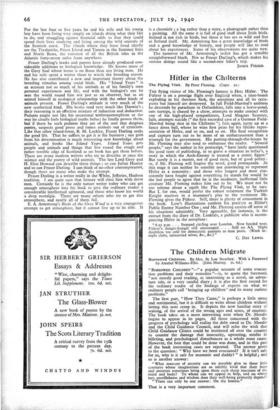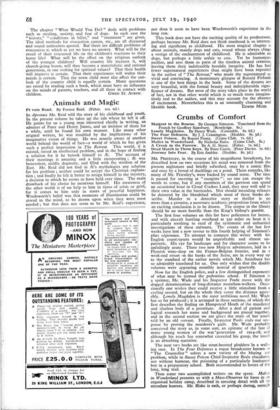The Children Migrate
" BORROWED CHILDREN "—" a popular account of some evacua- tion problems and their remedies "—is, to quote the foreword, " not merely good reading, as interesting' as a novel, an adven- ture tale, or a very candid diary ; it is also the first record for the ordinary reader of the findings of experts on what we ordinary people call bringing up children' and its many curious problems."
The first part, " How They Came," is perhaps a little smug and sentimental, but it is difficult to write about children without letting this note creep in. It depicts the now familiar story of waiting, of the arrival of the wrong ages and sexes, of enuresis. The book takes on a more interesting note when Dr. Moodie begins to appear in its pages. All those concerned with the progress of psychology will realise the debt owed to Dr. Moodie and the Child Guidance Council, and will echo the wish that Child Guidance Clinics could be instituted all over the country to counter the damage that insecurity, uprooting, misfits in billeting, and psychological disturbances as a whole must cause. However, the best that could be done was done, and in this part of the book interesting cases are reported. The answer given to the question: " Why have we been evacuated? If it isn't safe for us, why is it safe for mummie and daddy? " is helpful ; and so is another answer : " What measure of security can we possibly give to these little creatures whose imaginations are so terribly vivid that their fears and anxieties sometimes bring upon them such sharp reactions of the mind and body? To whom can we appeal to help, and on whose tact, unselfishness and wisdom does their well-being primarily depend?
" There can only be one answer: On the hostess."
That is a very important comment. The chapter " What Would You Do? " deals with problems such as stealing, anxiety, and fear of dogs. In each case the " history," " conditions in billet," and " treatment " are given. The ideal methods for evacuation .camps, etc., are all discussed and sound authorities quoted. But there are difficult problems of evacuation tc which as yet we have no answer. What will be the result of their evacuated life on the children's reactions to their home life? What will be the effect on the religious outlook of the younger children? Will country life increase it, will church-going lessen, will they become a materialistic and rational generation, or one seeking for spiritual values? That their health will improve is certain. That their experiences will widen their minds is certain. That the town child must also affect the out- look of the country child is equally certain. Many questions are raised by reading such a book, which must have an influence on the minds of parents, teachers, and all those in contact with



































 Previous page
Previous page